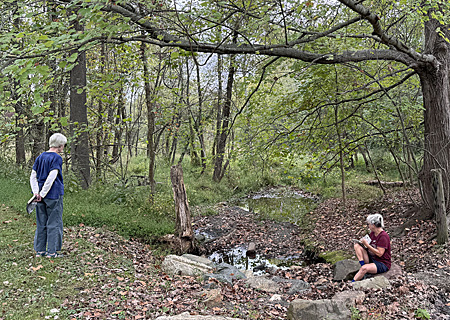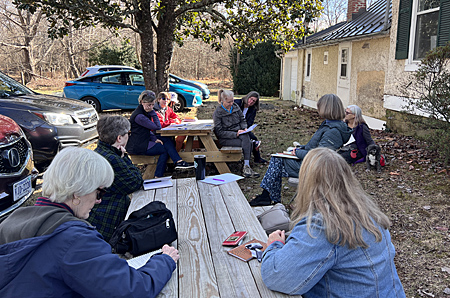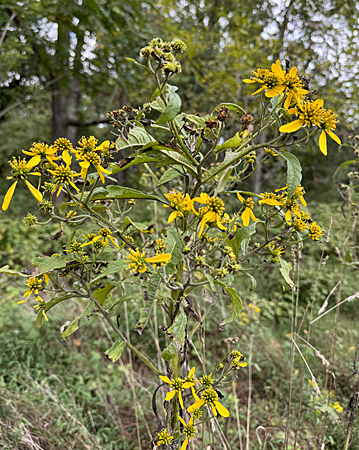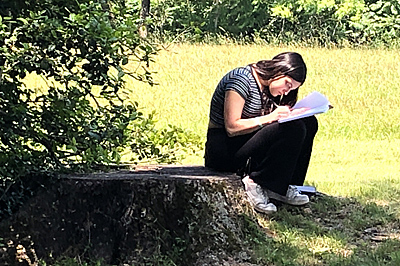Volume 29 Issue 1, Winter 2024
by Geena Riverstone
Once a month, Loudoun Wildlife offers a Writing in Nature workshop at Morven Park in Leesburg. The 90-minute workshop is led by Nancy Morgan, who has a master’s degree in transformative language arts, which is a therapeutic writing practice that helps people navigate life’s challenges, reduce stress, and find peace of mind.

Workshop participants find much to observe — and to inspire them — at the stream that runs alongside their Gate House meeting place. Photo by BJ Lecrone
After Morgan retired and moved to Leesburg in 2016, she discovered several Loudoun Wildlife programs being offered near her. At that time, Morgan says, “new research about the health benefits of spending time in nature was widely publicized.”
Before retiring, Morgan was director and writing clinician for the Georgetown Lombardi Arts and Humanities Program, where she helped people with cancer and their families and medical caregivers engage in the arts to address the emotional impact of illness. Morgan is an expert on teaching people how to feel better emotionally through the practice of expressive writing, or writing about thoughts and feelings.
Through Loudoun Wildlife activities, Morgan met Ann Garvey, a master naturalist and longtime Loudoun Wildlife volunteer. Morgan and Garvey decided to collaborate on a nature activity to offer to the community: Garvey would lead a walk to explore wildlife, and Morgan would moderate a related writing workshop. After Garvey secured permission from Loudoun Wildlife leaders, the duo led a guided nature walk and writing workshop at Morven Park. Later, they led a similar combined activity at Rust Sanctuary.

The group usually meets outside, though the weather occasionally drives them into the Gate House (which is also the headquarters of Loudoun Wildlife). Photo by BJ Lecrone
Soon thereafter, Morgan designed a workshop that integrated research findings on the combined health benefits of writing and spending time in nature. In early 2021, she moderated a writing in nature workshop at Morven Park and was invited to do another. The workshop became a monthly event later that year.
Morgan says moderating the workshop is immensely satisfying, and many regular participants are equally enthusiastic. Martha Baine, a retired librarian and archivist who has been attending since July 2022, says, “I think about it during the month, looking forward to the next time.”
A day or so before the workshop, participants receive an email with Morgan’s theme for that month. Recent themes have explored metamorphosis, the interdependence of wildlife, and the importance of conserving natural resources.
After navigating the gravel road and parking outside the Morven Park Gate House, everyone meets at picnic benches underneath a magnolia tree. Or, if the weather is not cooperating, the group gathers inside the Gate House instead.
“We are here to strengthen our ties to nature,” Morgan said during a recent workshop. “We are also creating a sense of community.” Although participants represent diverse backgrounds, all share an appreciation for nature and language.

Blooming Wingstem greets the nature writers with a splash of yellow in October. Photo by BJ Lecrone
To introduce the month’s theme, Morgan recites poetry, shares song lyrics, or reads prose. She further develops the theme by prompting a group discussion. Her warm and caring approach creates an environment where participants feel safe sharing their thoughts and personal history.
Morgan then invites group members to find examples of the theme in the nature around them, and to consider the theme in relation to their own lives. “Nature is a very good teacher,” she says. “Just engage all your senses and pay attention.”
Wandering through the park, writers may notice such things as a fragile cicada exoskeleton or slimy green algae. Their ears may tune in to songbirds chatting, the creek gurgling, or a black walnut thumping as it falls to the ground. Baine describes the 1,000-acre park as “the most peaceful, freeing, calming, beautiful place.” She says it is “a haven out of traffic and shopping and rushing and noise.”
“Being outside in nature grounds me,” says participant Barbara Thompson, a biologist and retired leadership trainer. She says it allows her creativity the space to wander and be inspired.
An important feature of this workshop is that Morgan encourages participants to spend the time however it would benefit them most. The workshop is not a writing competition, and no one is expected to be Rachel Carson, Henry David Thoreau, or Emily Dickinson.

Caroline Castagna jots down her thoughts during a summer workshop. Photo by BJ Lecrone
“We can write — anything we want — draw, sit, and look. We can go back to the group and read what we’ve written or just talk about what we saw, or not,” Baine says.
Morgan encourages everyone to have fun. “Writing can be playful,” she says, “and it can be cathartic, pure joy.”
After the group assembles again, participants may choose to share what they have written or thought about. “Nancy always has thought-provoking prompts that take our discussions to meaningful places,” says Kelly Geurts, a retired K-12 teacher with a passion for nature and the arts. “I have learned so much from everyone and value the depth of our conversations.”
When the group explores their perceptions and personal experiences, new connections can spark between strangers. “Each person brings their diverse life experiences that help me see the writing prompt in rich new ways,” says Thompson.
“I find the rhythms and beauty of the natural world to be very inspiring,” Geurts says. “Each month I walk away energized and thankful.”
The Writing in Nature workshop takes place at 11 a.m. on the first Thursday of each month. Register via the event calendar.
Geena Riverstone is a professional writer and editor and a Loudoun Wildlife volunteer.

